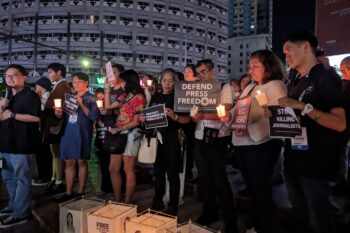BULUAN, Maguindanao (MindaNews/27 April) – After the displacement of thousands of civilians caused by the “all-out offensive” against the Bangsamoro Islamic Freedom Fighters, Maguindanao is now dealing with another calamity – the damage to aqua-agricultural resources due to the dry spell.
In a press conference here Saturday, Gov. Esmael “Toto” Mangudadatu announced that the Sangguniang Panlalawigan (SP) extended the state of calamity that was declared last month in response to the drought that has affected 34 of the province’s 36 towns.
He said the declaration authorized the provincial and municipal governments to use their calamity funds for the rehabilitation of affected farms and farmers.
Local agriculture officials reported on April 14 that the drought already damaged 24,415 metric tons of rice, corn, root crops, fruits, coffee and legumes in 7,816 hectares of farms cultivated by 7,979 farmers, placing the value of the damages at P97.3-million.
Citing the officials’ warning the dry spell could worsen, Mangudadatu appealed for assistance from the national government.
“The national government should also assist Maguindanao, not just other provinces like what we are seeing on TV. Aside from the man-made calamity we are facing, we are also affected by the dry spell, and this is the biggest,” he said.
He said the support could be in the form of high-yielding seeds or vegetable seeds.
Last March 4, the SP declared a state of calamity after the offensive against the BIFF spread to 13 municipalities, displacing some 125,000 residents.
Provincial agriculture officer Salik Panalunsong said the military offensive, which reportedly left some 100 casualties mostly from the rebel group, forced hundreds of farmers to abandon 2,680 hectares of rice, corn and green mongo farms.
He said the abandoned crops were damaged during the dry spell resulting to a loss of 8,622 metric tons valued at P27.6-million.
Integrated Provincial Health Officer Tahir Sulaik said the dry spell also aggravated the situation in evacuation camps because potable water became scarce.
Mangudadatu confirmed that some evacuees have remained in evacuation camps for fear of their safety if they return to their homes.
The Autonomous Region in Muslim Mindanao, which has been complementing the relief operations, reported last week that 10,648 displaced families have already returned home but 14,400 others remained in evacuation camps. (Ferdinandh Cabrera/MindaNews, with reports from Cayetado Daquiado)
